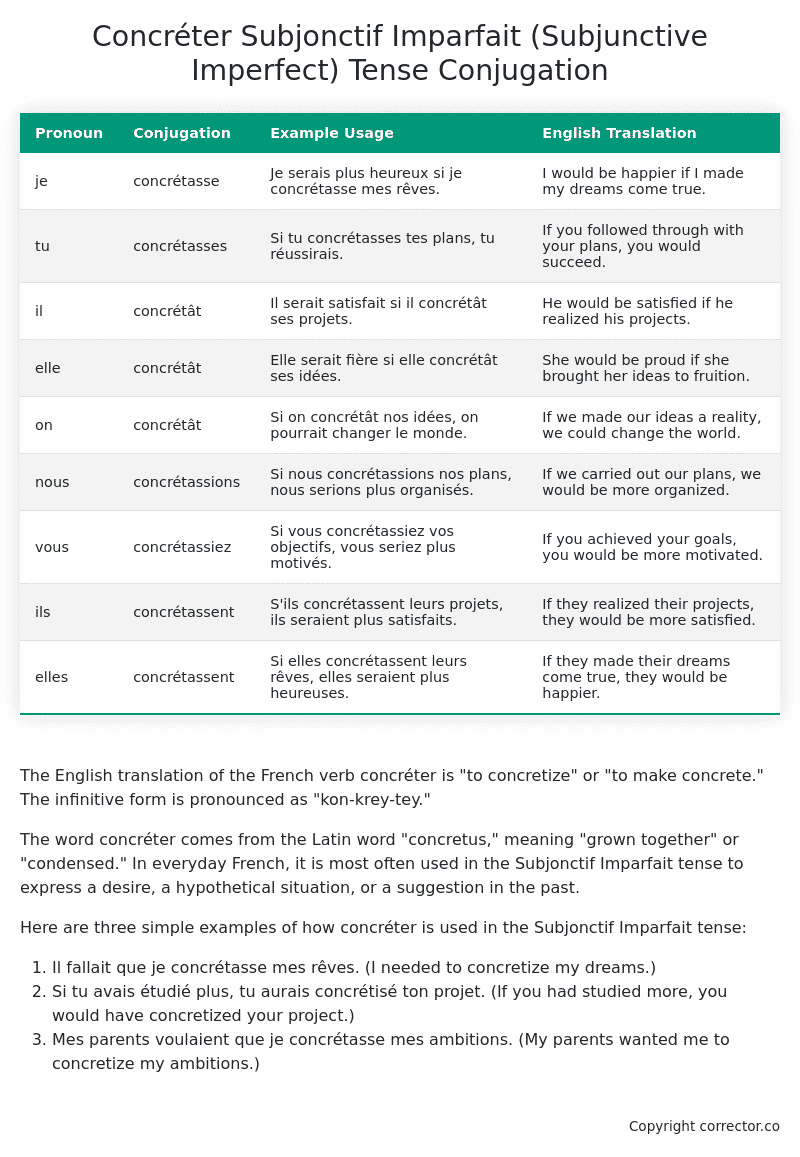Subjonctif Imparfait (Subjunctive Imperfect) Tense Conjugation of the French Verb concréter
Introduction to the verb concréter
The English translation of the French verb concréter is “to concretize” or “to make concrete.” The infinitive form is pronounced as “kon-krey-tey.”
The word concréter comes from the Latin word “concretus,” meaning “grown together” or “condensed.” In everyday French, it is most often used in the Subjonctif Imparfait tense to express a desire, a hypothetical situation, or a suggestion in the past.
Here are three simple examples of how concréter is used in the Subjonctif Imparfait tense:
- Il fallait que je concrétasse mes rêves. (I needed to concretize my dreams.)
- Si tu avais étudié plus, tu aurais concrétisé ton projet. (If you had studied more, you would have concretized your project.)
- Mes parents voulaient que je concrétasse mes ambitions. (My parents wanted me to concretize my ambitions.)
Table of the Subjonctif Imparfait (Subjunctive Imperfect) Tense Conjugation of concréter
| Pronoun | Conjugation | Example Usage | English Translation |
|---|---|---|---|
| je | concrétasse | Je serais plus heureux si je concrétasse mes rêves. | I would be happier if I made my dreams come true. |
| tu | concrétasses | Si tu concrétasses tes plans, tu réussirais. | If you followed through with your plans, you would succeed. |
| il | concrétât | Il serait satisfait si il concrétât ses projets. | He would be satisfied if he realized his projects. |
| elle | concrétât | Elle serait fière si elle concrétât ses idées. | She would be proud if she brought her ideas to fruition. |
| on | concrétât | Si on concrétât nos idées, on pourrait changer le monde. | If we made our ideas a reality, we could change the world. |
| nous | concrétassions | Si nous concrétassions nos plans, nous serions plus organisés. | If we carried out our plans, we would be more organized. |
| vous | concrétassiez | Si vous concrétassiez vos objectifs, vous seriez plus motivés. | If you achieved your goals, you would be more motivated. |
| ils | concrétassent | S’ils concrétassent leurs projets, ils seraient plus satisfaits. | If they realized their projects, they would be more satisfied. |
| elles | concrétassent | Si elles concrétassent leurs rêves, elles seraient plus heureuses. | If they made their dreams come true, they would be happier. |
Other Conjugations for Concréter.
Le Present (Present Tense) Conjugation of the French Verb concréter
Imparfait (Imperfect) Tense Conjugation of the French Verb concréter
Passé Simple (Simple Past) Tense Conjugation of the French Verb concréter
Passé Composé (Present Perfect) Tense Conjugation of the French Verb concréter
Futur Simple (Simple Future) Tense Conjugation of the French Verb concréter
Futur Proche (Near Future) Tense Conjugation of the French Verb concréter
Plus-que-parfait (Pluperfect) Tense Conjugation of the French Verb concréter
Passé Antérieur (Past Anterior) Tense Conjugation of the French Verb concréter
Futur Antérieur (Future Anterior) Tense Conjugation of the French Verb concréter
Subjonctif Présent (Subjunctive Present) Tense Conjugation of the French Verb concréter
Subjonctif Passé (Subjunctive Past) Tense Conjugation of the French Verb concréter
Subjonctif Imparfait (Subjunctive Imperfect) Tense Conjugation of the French Verb concréter (this article)
Subjonctif Plus-que-parfait (Subjunctive Pluperfect) Tense Conjugation of the French Verb concréter
Conditionnel Présent (Conditional Present) Tense Conjugation of the French Verb concréter
Conditionnel Passé (Conditional Past) Tense Conjugation of the French Verb concréter
L’impératif Présent (Imperative Present) Tense Conjugation of the French Verb concréter
L’infinitif Présent (Infinitive Present) Tense Conjugation of the French Verb concréter
Struggling with French verbs or the language in general? Why not use our free French Grammar Checker – no registration required!
Get a FREE Download Study Sheet of this Conjugation 🔥
Simply right click the image below, click “save image” and get your free reference for the concréter Subjonctif Imparfait tense conjugation!

Concréter – About the French Subjonctif Imparfait (Subjunctive Imperfect) Tense
Formation
Common Everyday Usage Patterns
Interactions with Other Tenses
Subjonctif Présent
Indicatif Passé Composé
Conditional
Conditional Perfect
Summary
I hope you enjoyed this article on the verb concréter. Still in a learning mood? Check out another TOTALLY random French verb conjugation!


